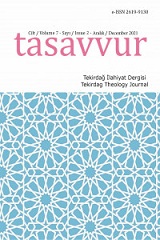4-6 Yaş Kur’an Kurslarında Görev Yapan Öğreticilerin Bu Kurslardaki Eğitim Süreçleriyle İlgili Görüşleri (Çorlu Örneği)
The Views of the Instructors Working in the 4-6 Years-Old Quran Courses Regarding the Education Process in These Courses (Example of Çorlu)
Author(s): Muzaffer Üzümcü, Nuran ÇınarSubject(s): Education, Islam studies, Preschool education, Qur’anic studies
Published by: Tekirdağ Namık Kemal Üniversitesi İlahiyat Fakültesi
Keywords: Religious education; 4-6 Age Group Quran Courses; Opinions of the instructors; Qualitative research; Focus group interview;
Summary/Abstract: Childhood is an important period in terms of religious development as in other areas of development. In this period children may inherit basic religious knowledge and values to a certain extent from their family. However it is clear that they need an education under the guidance of an expert. Religious education is not given as a separate lesson to children under the age of 10 in formal education in Turkey. Thus this makes it necessary to meet this need through mass religious education. Until 2012, children not graduated from primary school were even prohibited from attending summer Quran courses. Eventually the groundlessness of this ban was realized and Qur'an Courses for the ages of 4-6 have been opened in 2013, providing an opportunity for children to receive religious education. These courses attract great attention of families who want to rise their children according to the religion they belong to. For these courses-which have not yet completed the institutionalization process- to become meaningful and to continue their existence, a qualified education is necessary. Determining and evaluating the thoughts of the instructors- who are one of the most important factors determining the quality of educational activities-about the education given in these courses, will contribute to increasing the efficiency of the courses. In this qualitative study, the views of the instructors who works in the Çorlu district of Tekirdağ, were obtained through focus group interviews using semi-structured interview forms. The data obtained were evaluated using descriptive and content analysis methods.
Journal: Tasavvur Tekirdağ İlahiyat Dergisi
- Issue Year: 7/2021
- Issue No: 2
- Page Range: 1449-1490
- Page Count: 42
- Language: Turkish

